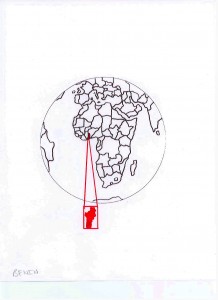BENIN
A. THE COUNTRY
The Republic of Benin is a long narrow country in West Africa.
Government is a stable multiparty democracy. Subsistence agriculture
and cotton are the main income sources. Efforts to uplift the economy
too often fail because of corruption; as a result, Benin remains one of
the world’s poorest countries. Some 75% of economic activity is
underground. This is deeply tied to Nigerian interests and makes Benin
very financially vulnerable.
B. THE PEOPLE
The population is ~9,300,000 and official language French. Trade
languages are Fon in south, Oendi in north. Allegedly, tens of
thousands of children are smuggled to eastern neighbours each year to
work as child labourers and are often maltreated and abused.
There are more than 60 ethnic groups, mostly in the south.
~59.5% are Guinean, ~17.4% Gur, ~13.1% Yoruba, ~4.8% Fulani, ~5.2%
Others (Mande, Songhai, Various Africans, French, Lebanese).
Increasing undocumented numbers of Burkinabe and Togolese are present.
C. RELIGIONS AND CHRISTIANITY/PENTECOSTALISM
All religions are free to practice and propagate their faith.
~39.89% claim to be Christian, ~35.95% Ethnoreligionist, ~23.5% Muslim,
~0.3% Baha’i, ~0.27% Non-religious, 0.09% Other.
Animism is a powerful force in Benin. Although Christianity is poised
to numerically overtake ethnic religions, many claiming Christianity go
to church on Sunday and consult the witch doctor during the week.
In the Christian category:
~21.4% are Catholic, ~5.92% Protestant, ~4.98 Independent, ~4.8% are
considered ‘marginal’, ~2.7% Unaffiliated.
Evangelicals represent ~8.3% of the population.
Charismatics represent ~14.8% and of these ~6.3% are Pentecostals.
Donna Siemens
References:
http://en.wikipedia.org
Operation World, Jason Mandryk. Colorado Springs: Biblica Publishing, 2010.

